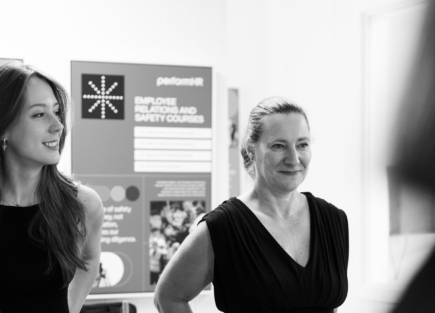Anxiety is the most common health condition in Australia. According to Beyond Blue everyone feels anxious from time to time with 1 in 4 people (1 in 3 women and 1 in 5 men) experiencing anxiety at some point in their life.
The Australian Psychological Society states that anxiety is a relatively common and natural feeling that is generally a short-lived response to a stressful situation. It usually presents itself in times that feel unfamiliar, or challenging, or when an individual is feeling uncertain, such as a job interview, public speaking or sitting for an exam. When those anxious feelings become all-consuming, they refuse to go away or they make it difficult to continue on with everyday life and tasks, that may be a sign of more than just situational anxiety, and rather, an anxiety disorder. It may be characterised as the silent killer taking over our workplaces.
What is anxiety?
According to Sane.org, an Australian national Mental Health charity, anxiety disorder is a medical condition characterised by persistent, extreme worry, often presenting with the following symptoms:
- Restlessness and avoidance
- Difficulty concentrating
- A rapid heartbeat
- Trembling and/or shaking
- A feeling of light-headedness
- Numbness or nausea
- Excessive sweating.
Anxiety disorders are believed to be caused my numerous factors, with many individuals more than likely born with a genetic vulnerability to develop anxiety. Personality traits or stressful life events and uncertainty may exacerbate a pre-existing condition or trigger the development of an anxiety disorder.
Times of uncertainty
2020 has certainly seen more than its fair share of uncertainty. With Black Summer and more recently the COVID-19 pandemic, Australians have been faced with some harrowing times, and all within a short period of six months.
Whilst managing uncertainty is considered a normal part of everyday life, an individual’s ability to manage uncertainty varies. Whilst some may be fine with a lot of uncertainty in their life, others find it difficult to manage with even the smallest amount. Anxious people are most likely to sit on the latter end of this scale, being very intolerant to high levels of uncertainty. When someone who is intolerant to uncertainty is exposed to increased levels, their reaction typically includes increased levels of worry, as well as avoidance or attempts to eliminate that uncertainty.
Anxiety Stressors
During this year’s Black Summer and COVID-19 pandemic, HR teams may have seen some of your employees demonstrate a more adverse reaction to these times of uncertainty when they presented at work. Some of the stress that stems from times of uncertainty include, but are not limited to:
- Financial – for example, during the COVID-19 pandemic, many employees saw a change to working hours, or even a loss of employment, whether it was theirs or an immediate family member
- Balancing work and caring responsibilities
- Changes to activities that support good mental health
- Concern for vulnerable family members and/or friends – for example, during Black Summer, employees may have had family members or friends that were living close to the disaster area, some of which they may not have been able to gain access to, to visit or check on welfare.
Mentally Healthy Workplaces
All organisations and HR service providers should strive for what is considered a ‘mentally healthy’ workplace. Having a workplace that is deemed mentally healthy is one that promotes and protects mental health whilst encouraging and empowering individuals affected to seek help for anxiety or depression. The Work Health and Safety Act 2011 and Safe Work Australia cover risks to mental health in the workplace.
Whilst this covers work-related mental health conditions that stem from hazards in the workplace such as job demand, HR support and organisational changes, it is still a reasonable expectation that an employer keeps an eye out for any changes in employee behaviour that may stem from mental health conditions arising from outside of the organisation.
This is a particularly important responsibility for Leaders in an organisation as they play a critical role in driving the workplace policies and procedures that are in place to promote a mentally healthy workplace. Your HR team or outsourced HR support should be your starting point in making sure that you have the right infrastructure in place while meeting your regulatory requirements.
A study commissioned by TNS and Beyond Blue titled State of Workplace Mental Health in Australia, found that employees viewed mentally healthy workplaces as being just as important as physically safe ones. Further, the survey found that organisations which valued mental health were more likely to be productive, with 72% of employees surveyed in agreement and 71% agreement among leaders, and, Leaders who focus on mental health in the workplace inspired respect amongst employees, with 65% in agreement.
Benefits of a Mentally Healthy Workplace
There are many benefits to providing support for employees with a mental health condition, including:
- The retention of skills and experience
- Avoiding the costs associated with hiring and training a new team member
- Building a supportive culture that demonstrates to employees that they are cared for and valued.
In addition to this, work can play an important role in the recovery of an individual with a mental health disorder; providing structure, purpose and social interaction. Fostering positive interactions in the workplace can play an instrumental role in the recovery.
Mentally Healthy Workplaces During Uncertainty
To assist in managing anxiety during times of uncertainty there are a few simple steps an organisation can follow as a part of their human resource strategy to deal with anxiety:
- Check in with your team; ask them how they are and if there is anything that is bothering them. It is important that when you do this, you still maintain the employees’ privacy
- If a team member identifies that they are struggling, acknowledge their feelings and reassure them that they are doing what they can in the circumstances
- If a team member identifies that they are struggling, review their progress regularly, positive feedback can boost confidence and recovery, whilst also ensuring productivity
- Continue to stay up to date about the circumstances surrounding the uncertainty, such as information passed on from Government bodies. Ensure to pass this information on to your team to ensure they are kept well-informed, making sure this information is kept in a central place for ease of access
- Support any ideas to address psychological risks where possible
- Provide your team with a point of contact where they can go to discuss their concerns, such as a management representative, an Employee Assistance Program or the HR team
- Inform your team about their entitlements, should they become unfit for work or have caring responsibilities.
If a leader identifies that an individual, or group of individuals are having a particularly hard time during a time of uncertainty, they may consider making reasonable adjustments, including:
- Temporary changes to workload, or work site location
- Flexible working hours, to enable a person to keep appointments with their treating health practitioner
- Working with the team member together to create goals, reminders or checklists to assist the employee with time management to stay on top of their workload.
When an organisation demonstrates their commitment to good mental health in the workplace, the organisation effectively contributes to the reduction of the stigma around mental health, resulting in a mentally healthier workplace. It is no surprise then that productivity will follow suit.
In summary
Should you need HR support or assistance in creating and maintaining a mentally healthy workplace, check out performHR’s Project Support, or to simply get in touch with our HR outsourcing team to discuss managed HR services that suit your needs.





